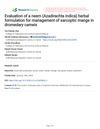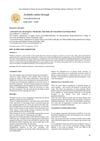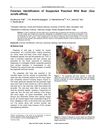27 citations,
February 2021 in “Clinical and Experimental Dermatology” Curcuma species improve skin health but need more research for best use.
 17 citations,
February 2015 in “Phytochemistry Reviews”
17 citations,
February 2015 in “Phytochemistry Reviews” Southeast Asian herbs show promise for skin and hair care, but more research is needed to confirm their effectiveness in cosmetics.
 12 citations,
December 2012 in “Current Drug Targets”
12 citations,
December 2012 in “Current Drug Targets” The Androgen Receptor could be a target for treating diseases like cancer, but more research is needed to confirm the effectiveness of potential treatments.
12 citations,
June 2007 in “Journal of steroid biochemistry and molecular biology/The Journal of steroid biochemistry and molecular biology” A reliable model for screening type II 5α-reductase inhibitors was created and validated.
8 citations,
January 2016 Curcumin can safely replace Sunset Yellow as a food colorant.
 5 citations,
January 2018 in “Skin Pharmacology and Physiology”
5 citations,
January 2018 in “Skin Pharmacology and Physiology” Curcuma aeruginosa extract lotion significantly reduces underarm hair growth.
 3 citations,
April 2016 in “The journal of investigative dermatology/Journal of investigative dermatology”
3 citations,
April 2016 in “The journal of investigative dermatology/Journal of investigative dermatology” Curcumin applied to the skin can start hair growth in mice.
 2 citations,
February 2023 in “BMC endocrine disorders”
2 citations,
February 2023 in “BMC endocrine disorders” Curcumin improved some metabolic factors in women with PCOS but did not affect cholesterol, insulin, or testosterone levels.
2 citations,
April 2020 in “International journal of research in pharmaceutical sciences” Using Malaysian medicinal plants in cosmetics can treat skin and hair issues with fewer side effects than synthetic products.
 2 citations,
November 2017 in “Biotechnology Letters”
2 citations,
November 2017 in “Biotechnology Letters” Researchers found four natural compounds that can change DHT levels in prostate cancer cells.
 1 citations,
February 2023 in “Drug Design Development and Therapy”
1 citations,
February 2023 in “Drug Design Development and Therapy” Plant adaptogens may help treat skin diseases and improve skin health, but more research is needed to fully understand how they work.
 1 citations,
April 2018 in “Our Dermatology Online”
1 citations,
April 2018 in “Our Dermatology Online” Massaging the scalp with a cosmetic containing certain natural inhibitors can significantly regrow hair in men with pattern baldness.
 January 2025 in “Current Issues in Molecular Biology”
January 2025 in “Current Issues in Molecular Biology” Certain plant extracts may help prevent hair loss and promote hair growth safely.

Ayurvedic herbs may reduce side effects and improve effectiveness of cancer treatments.
 February 2024 in “International journal of biology, pharmacy and allied sciences”
February 2024 in “International journal of biology, pharmacy and allied sciences” Plant-based treatments can effectively and safely treat hair loss.
 January 2024 in “AIP conference proceedings”
January 2024 in “AIP conference proceedings” Medicinal plant-based hydrogel films are promising for diabetic wound dressings.
 November 2023 in “British journal of nutrition”
November 2023 in “British journal of nutrition” Curcumin supplements increase adiponectin and decrease leptin in adults.
 August 2023 in “Vittalle”
August 2023 in “Vittalle” Mais estudos são necessários para garantir a eficácia e qualidade dos tratamentos de alopecia com plantas medicinais.
 January 2018 in “Hair transplant forum international”
January 2018 in “Hair transplant forum international” Nutrafol might help reduce hair loss due to inflammation, but more evidence is needed.
January 2011 in “The Chinese Journal of Dermatovenereology” Curcuma anti-acne gel effectively reduces acne symptoms.
January 2019 in “Can Tho University Journal of Science” The nanosilica-curcumin-bromelain complex speeds up wound healing and hair growth in burns.
 9 citations,
March 2011 in “Oxidative stress and disease”
9 citations,
March 2011 in “Oxidative stress and disease” Some herbal treatments are effective for skin disorders, but more research and regulation are needed.
 September 2018 in “Value in Health”
September 2018 in “Value in Health” Orphan drug benefit scores in Germany are influenced by phase III data and lack of alternatives, but not linked to price or discounts.
 September 2018 in “Value in Health”
September 2018 in “Value in Health” Clinical pharmacists are crucial in improving patient safety by reporting medication errors in hospitals.
 September 2018 in “Value in Health”
September 2018 in “Value in Health” Kids from areas with more high school dropouts have higher rates of brain injuries.
 19 citations,
March 2010 in “Bioorganic & Medicinal Chemistry Letters”
19 citations,
March 2010 in “Bioorganic & Medicinal Chemistry Letters” Curcumin and its derivatives can block an enzyme important for making testosterone, with one derivative being particularly strong.
 1 citations,
January 2023 in “Research Square (Research Square)”
1 citations,
January 2023 in “Research Square (Research Square)” A neem-based herbal treatment worked better than ivermectin for sarcoptic mange in camels, improving their recovery and overall health.
 1 citations,
June 2019 in “Journal of Biological and Scientific Opinion”
1 citations,
June 2019 in “Journal of Biological and Scientific Opinion” PPD in mehendi can cause serious health problems and needs regulation.
 1 citations,
August 2016 in “Journal of Buffalo Science”
1 citations,
August 2016 in “Journal of Buffalo Science” The animal was likely a wild boar.
 August 2018 in “Journal of the American Academy of Dermatology”
August 2018 in “Journal of the American Academy of Dermatology” A new cosmetic cream reduced facial redness and skin temperature after 4 weeks of use.























